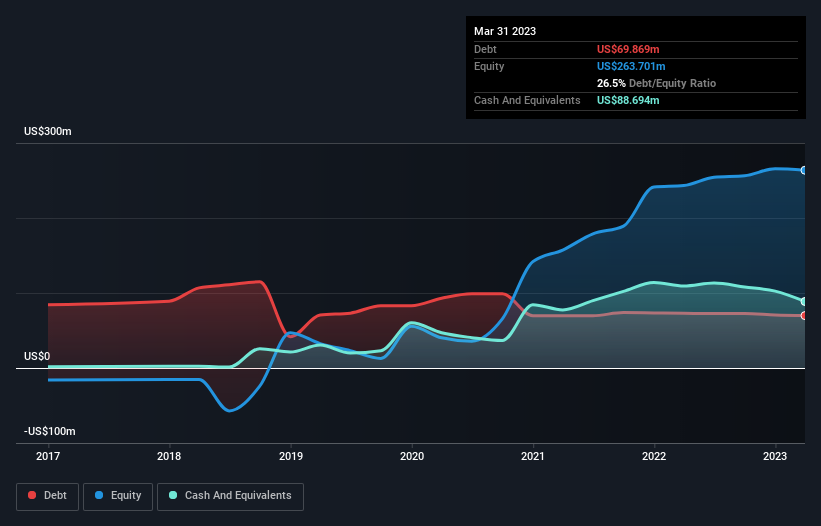David Iben put it well when he said, 'Volatility is not a risk we care about. What we care about is avoiding the permanent loss of capital.' It's only natural to consider a company's balance sheet when you examine how risky it is, since debt is often involved when a business collapses. We can see that Organogenesis Holdings Inc. (NASDAQ:ORGO) does use debt in its business. But the more important question is: how much risk is that debt creating?
Why Does Debt Bring Risk?
Debt assists a business until the business has trouble paying it off, either with new capital or with free cash flow. In the worst case scenario, a company can go bankrupt if it cannot pay its creditors. However, a more common (but still painful) scenario is that it has to raise new equity capital at a low price, thus permanently diluting shareholders. Of course, debt can be an important tool in businesses, particularly capital heavy businesses. The first step when considering a company's debt levels is to consider its cash and debt together.
View our latest analysis for Organogenesis Holdings
How Much Debt Does Organogenesis Holdings Carry?
You can click the graphic below for the historical numbers, but it shows that Organogenesis Holdings had US$69.9m of debt in March 2023, down from US$73.0m, one year before. However, its balance sheet shows it holds US$88.7m in cash, so it actually has US$18.8m net cash.

A Look At Organogenesis Holdings' Liabilities
According to the last reported balance sheet, Organogenesis Holdings had liabilities of US$76.1m due within 12 months, and liabilities of US$106.3m due beyond 12 months. Offsetting this, it had US$88.7m in cash and US$92.0m in receivables that were due within 12 months. So these liquid assets roughly match the total liabilities.
This state of affairs indicates that Organogenesis Holdings' balance sheet looks quite solid, as its total liabilities are just about equal to its liquid assets. So it's very unlikely that the US$498.8m company is short on cash, but still worth keeping an eye on the balance sheet. Despite its noteworthy liabilities, Organogenesis Holdings boasts net cash, so it's fair to say it does not have a heavy debt load!
It is just as well that Organogenesis Holdings's load is not too heavy, because its EBIT was down 57% over the last year. Falling earnings (if the trend continues) could eventually make even modest debt quite risky. When analysing debt levels, the balance sheet is the obvious place to start. But ultimately the future profitability of the business will decide if Organogenesis Holdings can strengthen its balance sheet over time. So if you want to see what the professionals think, you might find this free report on analyst profit forecasts to be interesting.
Finally, while the tax-man may adore accounting profits, lenders only accept cold hard cash. Organogenesis Holdings may have net cash on the balance sheet, but it is still interesting to look at how well the business converts its earnings before interest and tax (EBIT) to free cash flow, because that will influence both its need for, and its capacity to manage debt. Over the last three years, Organogenesis Holdings reported free cash flow worth 13% of its EBIT, which is really quite low. That limp level of cash conversion undermines its ability to manage and pay down debt.
Summing Up
While it is always sensible to look at a company's total liabilities, it is very reassuring that Organogenesis Holdings has US$18.8m in net cash. So we don't have any problem with Organogenesis Holdings's use of debt. The balance sheet is clearly the area to focus on when you are analysing debt. But ultimately, every company can contain risks that exist outside of the balance sheet. To that end, you should learn about the 4 warning signs we've spotted with Organogenesis Holdings (including 1 which shouldn't be ignored) .
If, after all that, you're more interested in a fast growing company with a rock-solid balance sheet, then check out our list of net cash growth stocks without delay.
New: AI Stock Screener & Alerts
Our new AI Stock Screener scans the market every day to uncover opportunities.
• Dividend Powerhouses (3%+ Yield)
• Undervalued Small Caps with Insider Buying
• High growth Tech and AI Companies
Or build your own from over 50 metrics.
Have feedback on this article? Concerned about the content? Get in touch with us directly. Alternatively, email editorial-team (at) simplywallst.com.
This article by Simply Wall St is general in nature. We provide commentary based on historical data and analyst forecasts only using an unbiased methodology and our articles are not intended to be financial advice. It does not constitute a recommendation to buy or sell any stock, and does not take account of your objectives, or your financial situation. We aim to bring you long-term focused analysis driven by fundamental data. Note that our analysis may not factor in the latest price-sensitive company announcements or qualitative material. Simply Wall St has no position in any stocks mentioned.
About NasdaqCM:ORGO
Organogenesis Holdings
A regenerative medicine company, develops, manufactures, and commercializes products for the advanced wound care, and surgical and sports medicine markets in the United States.
Excellent balance sheet with reasonable growth potential.
Similar Companies
Market Insights
Community Narratives




